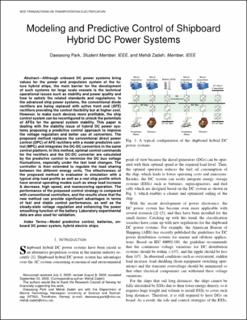| dc.contributor.author | Park, Daeseong | |
| dc.contributor.author | Zadeh, Mehdi | |
| dc.date.accessioned | 2021-03-03T12:03:20Z | |
| dc.date.available | 2021-03-03T12:03:20Z | |
| dc.date.created | 2021-01-18T18:19:46Z | |
| dc.date.issued | 2020 | |
| dc.identifier.issn | 2332-7782 | |
| dc.identifier.uri | https://hdl.handle.net/11250/2731404 | |
| dc.description.abstract | Although onboard DC power systems bring values for the power and propulsion system of the future hybrid ships, the main barrier for the development of such systems for large scale vessels is the technical operational issues such as stability and power quality and how to satisfy the related standards and regulations. In the advanced ship power systems, the conventional diode rectifiers are being replaced with active front end (AFE) rectifiers providing the control flexibility but at higher cost. However, to make such devices more profitable, the ship control system can be reconfigured to unlock the potentials of AFEs for the general system stability. This paper is dealing with the stability issue of hybrid DC power systems proposing a predictive control approach to improve the voltage regulation and better use of converters. The proposed method replaces the conventional direct power control (DPC) of AFE rectifiers with a model predictive control (MPC) and integrates the DC-DC converters in the same control platform. In this method, optimal control commands for the rectifiers and the DC-DC converter are calculated by the predictive control to minimize the DC bus voltage fluctuations, especially under the fast load changes. The controller is then extended to regulate the load sharing between the different energy units. The effectiveness of the proposed method is evaluated in simulation with a typical ship load profile as well as a real ship profile which have several operating modes such as steep load increase & decrease, high speed, and maneuvering operation. The performance of the proposed control strategy is compared with conventional controllers, and the results show that the new method can provide significant advantages in terms of fast and stable control performance, as well as the steady-state voltage regulation and enhancing the power smoothing function of the battery. Laboratory experimental data are also used for validation. | en_US |
| dc.language.iso | eng | en_US |
| dc.publisher | Institute of Electrical and Electronics Engineers (IEEE) | en_US |
| dc.title | Modeling and Predictive Control of Shipboard Hybrid DC Power Systems | en_US |
| dc.type | Peer reviewed | en_US |
| dc.type | Journal article | en_US |
| dc.description.version | acceptedVersion | en_US |
| dc.source.journal | IEEE Transactions on Transportation Electrification | en_US |
| dc.identifier.doi | 10.1109/TTE.2020.3027184 | |
| dc.identifier.cristin | 1873649 | |
| dc.description.localcode | © 2020 IEEE. Personal use of this material is permitted. Permission from IEEE must be obtained for all other uses, in any current or future media, including reprinting/republishing this material for advertising or promotional purposes, creating new collective works, for resale or redistribution to servers or lists, or reuse of any copyrighted component of this work in other works. | en_US |
| cristin.ispublished | true | |
| cristin.fulltext | postprint | |
| cristin.qualitycode | 1 | |
